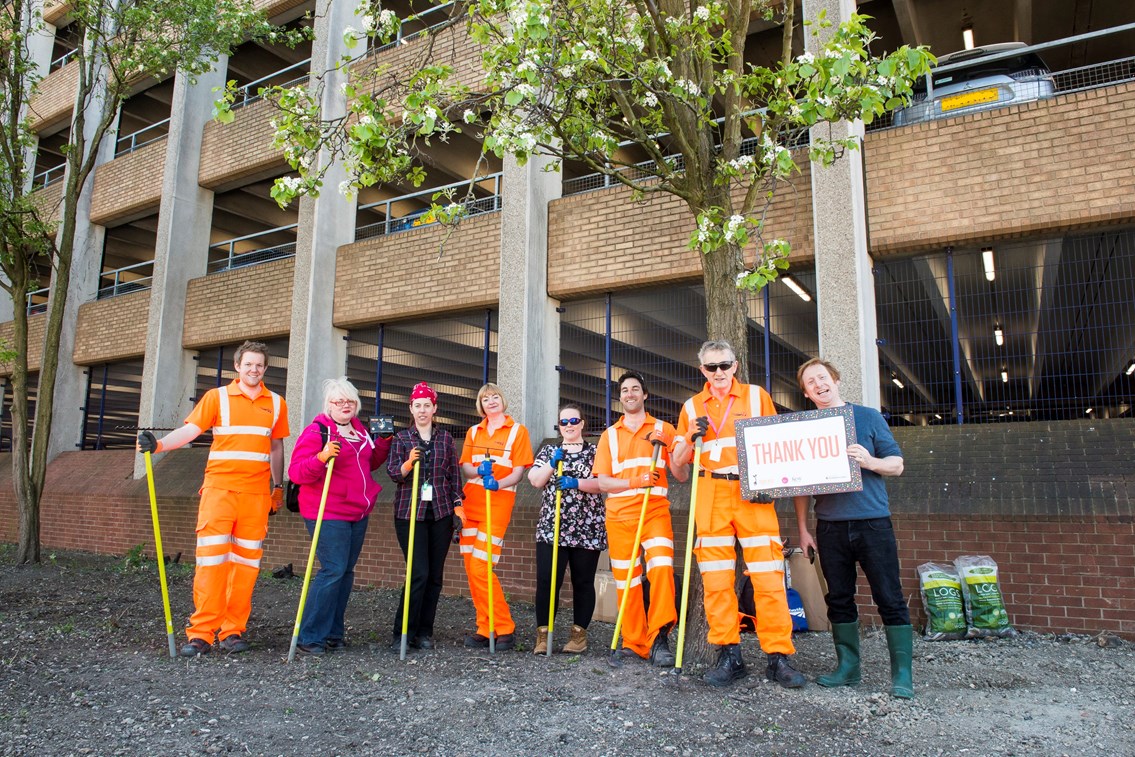Monday 11 May 2015
Flower power used to transform scrubland at Reading station
- Region & Route:
- | Southern
Passengers at Reading station will soon experience a brighter start to their day after volunteers from Network Rail, Kew Gardens and the University of Reading used their free time to create a wild flower garden and wildlife haven by the station’s multi-storey car park.
The area used to be home to low speed sections of track, known as sidings, and so the first job of the team was to break up the hard surface of the ground. They then turned their attention to clearing some of the more overgrown parts, before raking and sowing the seeds.
During their time at the site, the team worked closely with Vinny Ganley, co-ordinator of Kew Gardens’ ‘Grow Wild UK’ project, who specially selected the varieties of flower used to ensure they were suited to the English climate and would attract bees and other pollinators. Some of the colourful flowers chosen included ‘Red Campion’, ‘Ox Eye Daisy’, ‘Corn Marigold’ and ‘Meadow Buttercup’.
Mike Franklin, Network Rail’s environmental specialist for the Thames Valley, said: “We take our role as a responsible neighbour very seriously, which is why we encourage our staff to volunteer for community projects such as this.
“We are keen to continue working with Kew Gardens on other projects and hope that once the meadow is in bloom, it will make the station area more attractive for passengers. We also hope it will help increase wildlife in the area, particularly bees, whose numbers are in decline.”
Vinny Ganley, co-ordinator of the ‘Grow Wild UK’ project, said: “Grow Wild UK is delighted to work in partnership with Network Rail to help transform this area of land that can be of such benefit to people and wildlife. It just shows what can be achieved when enthusiastic organisations, staff and volunteers come together.”
Ann Westgarth, community relations manager at the University of Reading, said: “Our student volunteers enjoyed a welcome break from exams and revision to help sow the wild flower area.
“The University of Reading is at the forefront of research into the importance of bees and pollinating insects so we were very happy to help provide an environment where they will thrive. We can’t wait to see this drab area full of colour and interest when the flowers bloom in the summer.”
ENDS
Notes to editors
For more information on Kew Gardens’ ‘Grow Wild UK’ project, please visit www.growwilduk.com.
Contact information
Passengers / community members
Network Rail national helpline
03457 11 41 41
Latest travel advice
Please visit National Rail Enquiries
Journalists
Victoria Bradley
Media relations manager (Western route)
Network Rail
01793 389749 / 07710 938470
victoria.bradley@networkrail.co.uk
About Network Rail
We own, operate and develop Britain's railway infrastructure; that's 20,000 miles of track, 30,000 bridges, tunnels and viaducts and the thousands of signals, level crossings and stations. We run 20 of the UK's largest stations while all the others, over 2,500, are run by the country's train operating companies.
Usually, there are almost five million journeys made in the UK and over 600 freight trains run on the network. People depend on Britain's railway for their daily commute, to visit friends and loved ones and to get them home safe every day. Our role is to deliver a safe and reliable railway, so we carefully manage and deliver thousands of projects every year that form part of the multi-billion pound Railway Upgrade Plan, to grow and expand the nation's railway network to respond to the tremendous growth and demand the railway has experienced - a doubling of passenger journeys over the past 20 years.
Follow us on Twitter: @networkrail
Visit our online newsroom: www.networkrailmediacentre.co.uk

